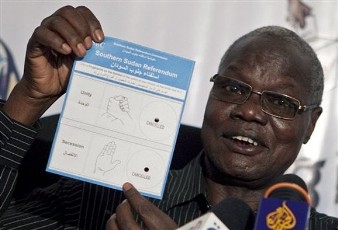S. Sudan‘s Chief Justice calls for speedy dispute resolution
By Ngor Arol Garang
September 13, 2011 (JUBA) – The Chief Justice of the Republic of South Sudan (RoSS), Justice Chan Reec Madut, on Tuesday directed primary courts to apply an Alternative Dispute Resolution (ADR) system in its proceedings to speed up disposal of cases.

The Chief Justice who was speaking in Juba on Tuesday at the opening of a stakeholders’ meeting to discuss the enhancement of the system, said 80% of all reported cases were handled in primary courts.
The meeting was one of the first senior judicial meetings since Madut’s appointment at the headquarters of the national judiciary. Madut played a key role in the referendum that led to South Sudan’s independence in July.
He said that the Alternative Dispute Resolution system was a way of resolving disputes outside the formal judicial process where parties meet with a third party, a mediator, who helps them resolve their dispute.
“I am sure if the primary courts apply Alternative Dispute Resolution or incorporate this system then we will be able to reduce a big number of pending cases,” he said.
Madut said currently the courts were able to deal with 100,000 cases yearly but this was only a quarter of the 400,000 they receive.
Apart from timely resolution of disputes, the chief justice also said that the system was cost effective and brought satisfaction to both parties.
Malek Mathiang Malek, president of high court in the state of Central Equatoria, suggested to the meeting that there should be an annual Alternative Dispute Resolution conference as a way to promote and publicise the ADR system.
He said the institution was ready to provide refresher training courses to those in need so as to ensure effective implementation of the system.
Malek further added that the institution was happy to be one of the consultants to analyse of the system and that it indicated the capability of the local institutions in analyzing matters for the national development.
Asked about structural hierarchy of the judicial system, Malek explained that the High Court is the highest court at the state level in South Sudan. Its most senior judge is its president and is answerable to the governor of the state for the performance and administration of the state judiciary. Judicial power in the states is vested in the state judiciary with the constitution of each state providing for the establishment of a state judiciary consisting of the hierarchy of courts: High Courts, County Courts and Any Other Courts and Tribunals.
State courts have civil and criminal jurisdiction in respect of the state, South Sudan and national laws, save that of a right to appeal as provided by the Interim Constitution. However, the South Sudan Legislative Assembly shall determine the civil and criminal procedures in respect of litigation or prosecution under South Sudan laws in accordance with the Interim Constitution.
(ST)
